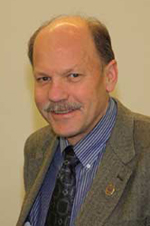April 2012

Nicholas S. Hill, MD
Since 2007, attendance at the International Conference has dropped. The financial crisis, 2009 influenza epidemic, and 2010 Iceland volcano have been named as possible contributors. But detractors say that a gathering of this sort has run its course—traveling is a hassle, practitioners everywhere are overwhelmed, and virtual communications are on the rise.
Yet, as if to prove the doomsayers wrong, ATS 2012 appears to be developing into a banner year. Registrations are running well ahead of the previous two years, and we have already set a record for submitted abstracts (more than 6,000).
Undoubtedly, the venue has a major influence—San Francisco is on the short list of almost everyone’s favorite cities. But a number of other factors are contributing to the robust health of the IC this year.
Despite the dips in attendance, the IC has remained strong and vibrant. The quality of the science presented is outstanding, and the meeting continues to draw the best basic and clinical scientists in our fields of pulmonary, critical care, and sleep medicine in the world.
At the same time, we have made great efforts to dispel the notion that our meeting doesn’t cater to clinicians. Continuing trends that began many years ago, IC Committee Chair David Au, MD, and Education Committee Chair Jim Beck, MD, have worked assiduously to make certain that clinician attendees have access to a truly outstanding experience.
The IC agenda now offers a Core Curriculum for clinicians as well as Maintenance of Certification opportunities. Clinicians can also learn from patients who are among the presenters at many sessions. In addition, we welcome patients to the meeting and offer more than a dozen patient oriented meet-the-expert sessions organized by our Public Advisory Roundtable.
This year, we’ll continue the Clinicians Center, which is situated adjacent to the exhibit area, where clinicians can sit, relax, enjoy refreshments, and meet with their peers. In addition, we’ll continue the Pulmonary, Critical Care, and Sleep Clinician Tracks that help clinicians navigate the agenda.
ATS 2012 will also address trainee needs, including travel awards for minority fellows and residents, to encourage attendance. Fellows have multiple opportunities to interact with peers and do career planning. We offer a Road Map for fellows to help with meeting navigation and have established a Center for Fellows and Junior Professionals to provide a venue for relaxing and networking.
Our highly successful Fellows Track Symposium provides travel awards to 140 trainees, as well as a two-day, state-of-the-art symposium designed specifically for fellows. Fellows can also attend our postgraduate course on Leadership and the Career Development Symposium. Also available is a Fellows Case Conference, during which unusual or challenging cases are presented to a panel of experts.
About half of all attendees come from beyond U.S. borders. We highly value our international attendees because of the quality of science and insights they bring from their cultures. Increasingly, these investigators conduct important basic and clinical studies that stimulate us and accelerate the progress of medicine. We offer travel awards for international trainees, resources for expediting visas, poster sessions for attendees from selected countries, and booths in our international village.
Our assemblies and committees meet during the IC, and we encourage members who have not yet become involved to attend the business meetings and volunteer for an assembly committee. We have meet-and-greet sessions before the formal business meetings where first-time attendees can introduce themselves to assembly leaders over refreshments in a relaxed setting. I particularly encourage younger members, international attendees, and industry members to attend.
The Opening Ceremony will be riveting as Dr John Luce recounts his experiences with the early AIDS epidemic in San Francisco. The many high quality symposia includes the President’s Symposium, which will focus on clinical, funding, regulatory and guideline issues in relation to the development of therapies to treat idiopathic pulmonary fibrosis. Dr. Michael Rosenblatt, former dean of Tufts University School of Medicine and current chief medical officer of Merck, will give the President’s Lecture on industry-physician relations from both sides.
Obviously, I am excited about the upcoming IC. Far from dying, the IC is very much alive, and offers an enormous amount for scientists of all stripes, trainees, clinicians, and even patients.
If you haven’t already, make plans to attend ATS 2012—it’s not too late!

